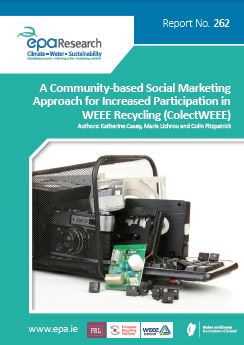Authors: Katherine Casey, Maria Lichrou and Colin Fitzpatrick
Summary: This study explored human behaviour in relation to small WEEE recycling through 26 in-depth interviews with 30 participants; observations and casual conversations at a civic amenity site and waste collection event; and participant observation at 25 retailers. The study proposes a multi-pronged approach to social marketing campaigns with the aim of increasing participation in small WEEE recycling.

Project ColectWEEE explored consumer experiences with WEEE. The project generated insight into what people do with their small WEEE. Data collection consisted of in-depth interviews with consumers in their homes and observations at WEEE collection points. The results should be of interest to all stakeholders involved in the promotion of WEEE recycling, including consumers.
Ireland is currently meeting the targets set by the WEEE Directive, with high collection rates predominantly in the categories of large household appliances and fridges/freezers. Collection rates for smaller WEEE are less successful by comparison. People tend to hoard small electrical and electronic devices in their homes or dispose of them in the general waste. The research found that, in general, consumers do not conform to policy when it comes to small WEEE, but even more so in the case of peripheral devices. To encourage increased recycling, researchers and policymakers need to better understand the dynamics of small WEEE within the home. This calls for a reconciliation of the policy perspective on small WEEE with the subjective experiences and interpretations that drive consumers’ behaviours. Addressing this need, the project utilised consumer research to investigate WEEE disposal behaviours from an “emic” perspective, that is, people’s experiences and interpretations of WEEE and its disposal, as these occur in everyday life.
Research findings from this research suggest that, for consumers, electronic and electrical devices exist in fluid, in-between states of meaning and perceived value, from the time of acquisition until their disposal. Small WEEE tends to be either consciously stored or abandoned in the home until a trigger prompts consumers to divest. Prompted to divest, consumers must decide what precisely to discard and how. Interventions can be introduced to make small WEEE more visible at home and to encourage consumers to dispose of small WEEE responsibly. Short-term interventions should augment the visibility and accessibility of WEEE recycling and longer term strategies should address issues of communication and trust building. Furthermore, the implementation of a circular economy opens up many different areas where further research is needed to identify additional paths to increased WEEE reuse and recycling.
https://www.epa.ie/media/epa-2020/publications/research/Research_262_Thumbnail[1].jpg